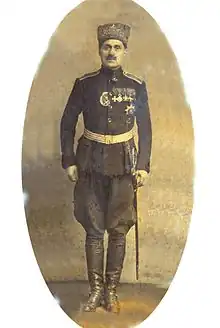Georgy Semyonovich Gotua
Georgy Gotua Georgian (გიორგი გოთუა); 13 January [O.S. 1 January] 1871 - 13 January 1936)s The only high-ranking officer of the Russian tsarist army who performed allied duty until the end of the World War I

Georgy Gotua | |
|---|---|
| Native name | გიორგი გოთუა |
| Born | 13 January [O.S. 1 January] 1871 Guria |
| Died | 13 January 1936 (aged 65) Belgrade |
| Buried | |
| Allegiance | Russian Empire Russian State (1918–1920) |
| Rank | Major General |
| Battles/wars | Russo-Japanese War World War I Russian Civil War |
| Awards | Cross of St. George Order of Saint Vladimir Order of Saint Stanislaus Order of Saint Anna Legion of Honour Croix de Guerre |
| Spouse(s) | Elena |
| Children | Georgy, Elena, Nina, Tamara, and Konstantin |
Biography
Gotua was born on 13 January [O.S. 1 January] 1871, in Guria. He graduated from the Kutaisi progymnasium in 1889 and the Tiflis infantry cadet school in 1896. In 1902 he served in the 256th Gunibsky reserve battalion, then in the 8th Krasnovodsk reserve battalion. Gotua served in the Russo-Japanese War.[1]
In 1909 Gotua served as a captain of an infantry reserve brigade,[1] and participated in World War I.
In the rank of captain of the 8th Turkestan Rifle Regiment, he was awarded the Cross of St. George. As part of the Russian Expeditionary Force in France, he fought in the territories of France and Germany. In 1916 he fought in France and, with the rank of lieutenant colonel, commanded a battalion of the 2nd special regiment of the 1st brigade (later colonel of the Special Brigade in France). Gotua commanded the Russian Legion.[2][3] This unit, as part of the French Moroccan Division was the first of the allied armies to breach the Hindenburg Line.[1][2][3]
After the end of World War I, Gotua was in the Volunteer Army (later Armed Forces of South Russia, first with the 2nd army reserve battalion in the beginning of 1919 and then as a Major General in command of the 7th Reserve Battalion from 3 November 1919. In 1921 he went into exile in Yugoslavia, living with the Don Cadet Corps (Russia) in Bileća.
Gotua died on 13 January 1936. He was buried in the Belgrade New Cemetery, the resting place of many Russian emigrants.[4]
Georgy had a son, Georgy Georgievich Gotua, who died in 1971 in Yugoslavia, and was buried with his father. Due to the impossibility of family reunification, the remaining children (Elena, Nina, Tamara and Konstantin) lived with their mother Elena in Georgia.
Awards and honors
- Cross of St. George (18 March 1915)[5]
- Order of Saint Vladimir, 4th class (19 December 1915)
- Order of Saint Stanislaus, 2nd class (2 September 1916)
- Order of Saint Anna, 2nd class (12 November 1916)
- Legion of Honour
- Croix de Guerre
External Links
- Готуа Георгий Семёнович
- Евгения Готуа — Поезд на Мариуполь
- Малиновский Р. Я. Солдаты России. — М.: Воениздат, 1988. — 455 с. — ISBN 5-203-00102-2
- Иван Добра. Белые тени.
- Валерии Яковлев Виват Франция! Прощаи Париж .
- Cockfield, Jamie H. With Snow on Their Boots: The Tragic Odyssey of the Russian Expeditionary Force in France During World War I. ISBN 0-312-17356-3
- Poitevin,Pierre, «La Mutinerie de la Courtine. Les regiments russes revoltes en 1917 au centre de la France», Payot Ed., Paris, 1938
References
- "VIP Studio - журнал «Современная наука» - Грузинские Белогвардейцы (участники Белого движения)". Archived from the original on 2014-08-08. Retrieved 2023-02-15.
- "Русский легион Чести: wolk28". 2017-09-23. Archived from the original on 2017-09-23. Retrieved 2023-02-15.
{{cite web}}: CS1 maint: bot: original URL status unknown (link) - "Русский экспедиционный корпус во Франции (1916-1918)". Archived from the original on 2014-08-08. Retrieved 2023-02-15.
- "Русское эмигрантское кладбище в Белграде | Московские прихожане храма Новомучеников и Исповедников Российских читают, принимают к сведению…". Archived from the original on 2017-07-10. Retrieved 2023-02-15.
- "Георгиевские кавалеры периода Первой мировой войны: именные списки - Г. | История, культура и традиции Рязанского края". Archived from the original on 2022-03-08. Retrieved 2023-02-15.
{{cite web}}: CS1 maint: bot: original URL status unknown (link)